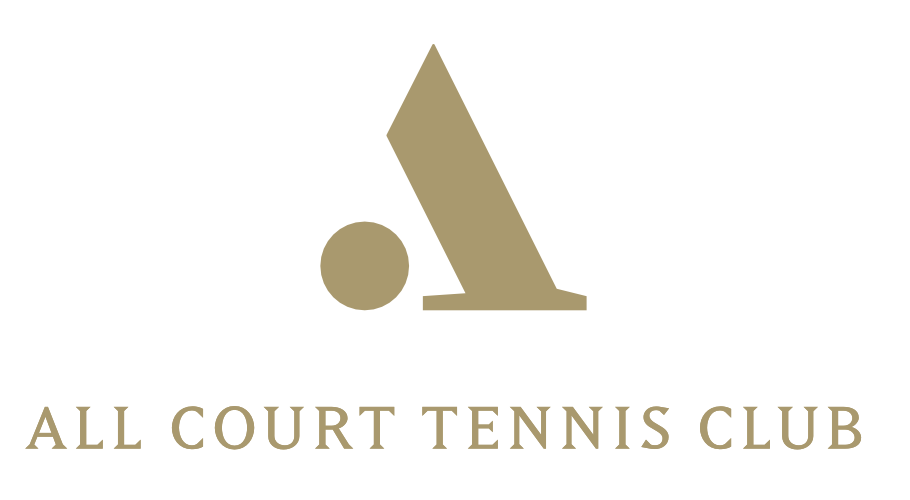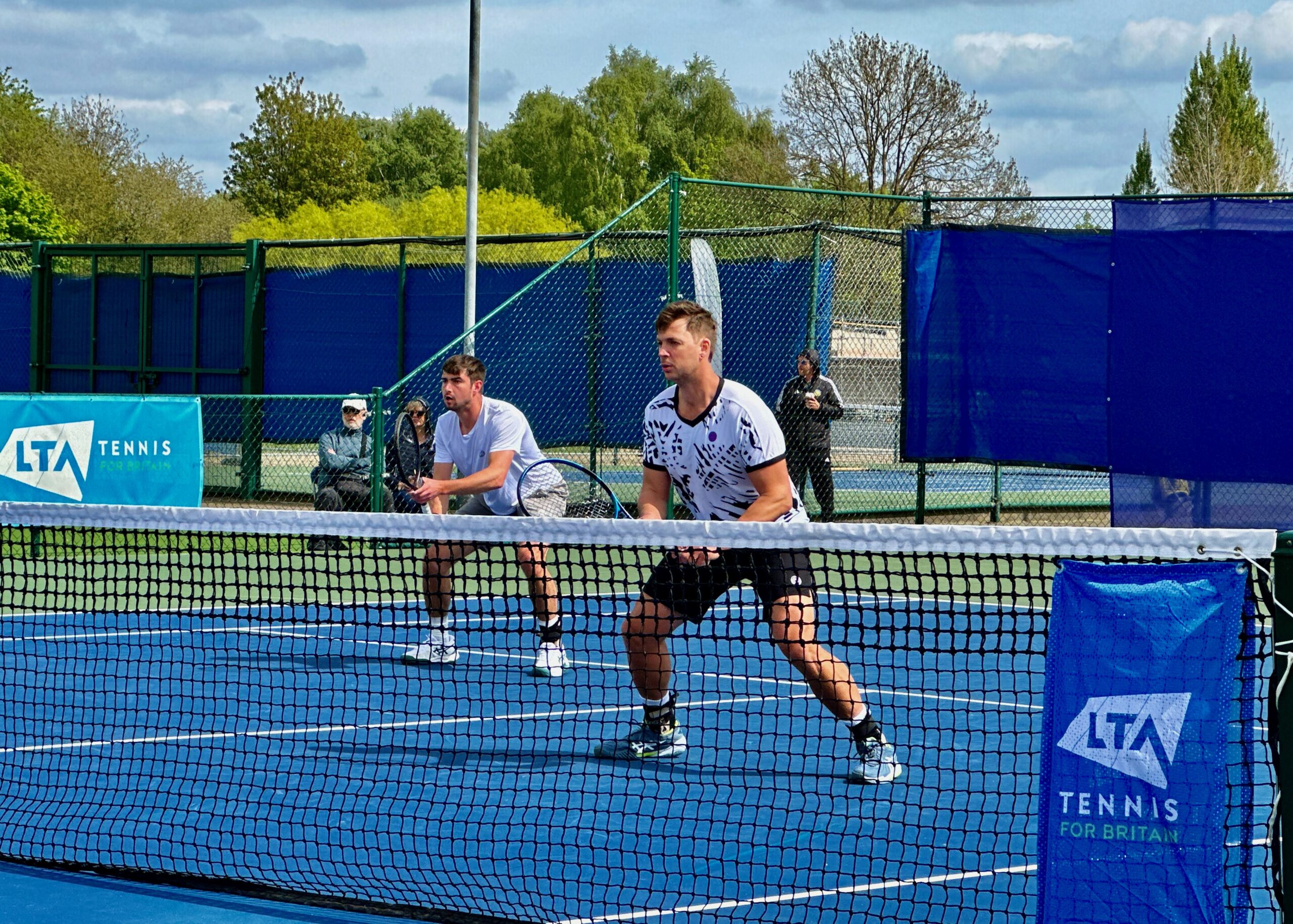After all, Willis had already had his day. In 2016, Willis came from seemingly out of nowhere, beat then-unknown Andrey Rublev and Daniil Medvedev in the qualies to make the Wimbledon main draw, win his first-round match and wind up on Centre Court to face none other than Roger Federer. The six-foot, four-inch, No. 772 in the world, fell to the man who has been called “The Master,” but received a standing ovation after losing 6-0 6-3 6-4.
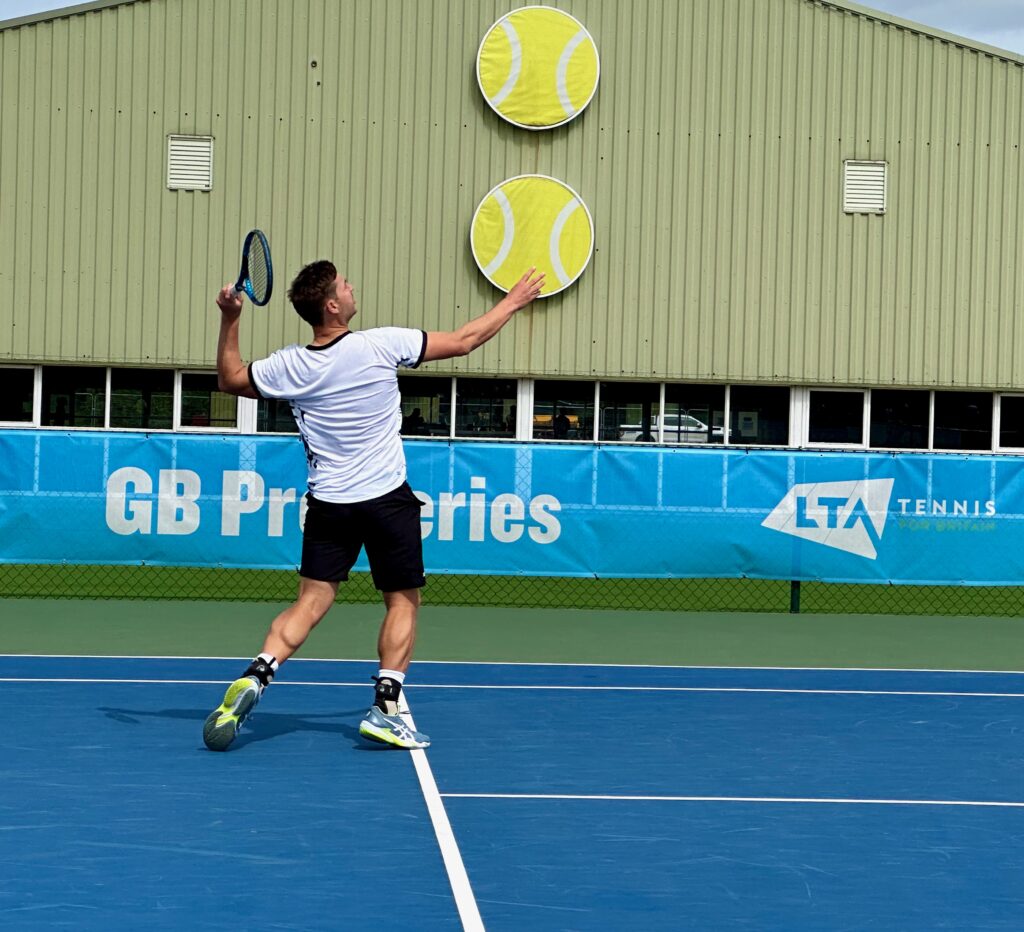
Marcus Willis playing at ITF Futures Nottingham 25K
Agents, sponsorship, World Team Tennis and other perks of the “big dance” came and… then it all went. Willis returned to his corner of the world. “When it all went quiet, it was strange, one minute everyone wants to speak to you and help you and the next minute they’re all gone. And then you’re injured, you’re not in love with tennis anymore and you realize you don’t have that many friends,” he said last week at the ITF Futures Nottingham 25K, the third in a series of ITF World Tennis Tour events at the centre.
Most people seldom get second chances, they say lightning rarely strikes twice. But Willis seems to be one of those — tall, handsome, charismatic and charming — on which the tennis gods smile. Last year, a member of his club asked if he wanted to join the tour again and he agreed to put up the money to do it. Willis didn’t have to think long before accepting, but with a twist: instead of singles, he’s focused on doubles with new partner, Scott Duncan. So far, the two have notched victories in France, Spain and all over England. They are aiming for the ATP Challenger Tour and with some luck, a Wimbledon Wildcard. He sat down in Nottingham to explain how, when and why.
Adrian Brune: Marcus, it’s great to sit down, since we last saw you at our All Court Tennis Club event in Dubai, quite a bit has changed! How is it to be out here again on tour?
Marcus Willis: I’m 32 now, and I played my first tournament when I was 14, so I’m fairly experienced when it comes to these events. Still, I don’t want to play this level forever. That’s not to say that this level is not good; I don’t know that there is a huge difference between that match and a challenger match. I think I’m on the brink of being a challenger player. My comeback has gone a lot better than expected. My goal was to be Top 500 by July, which is still 100 points away, so there is still work to do. But we have a good start.
AB: You guys were looking pretty good out there, although the tiebreak got a little tight. You hit three incredible serves, one ace and two they couldn’t return. What did you pull out of yourself?
MW: I’m always adapting. As you may have noticed, I’ve been wearing ankle supports, and struggling with my serve a bit. It’s not been dreadful, but it’s the best part of my game, and it’s been missing. I’ve been working out what’s been happening in terms of rhythm and timing. But mostly, when I’m in big moments, I just focus on me. I forget the score. I take myself to that practice court and just hit the serve. It’s very easy to whip through matches, keep looking at those numbers and not think about how you’re going to play your best matches. I work on the opposite.
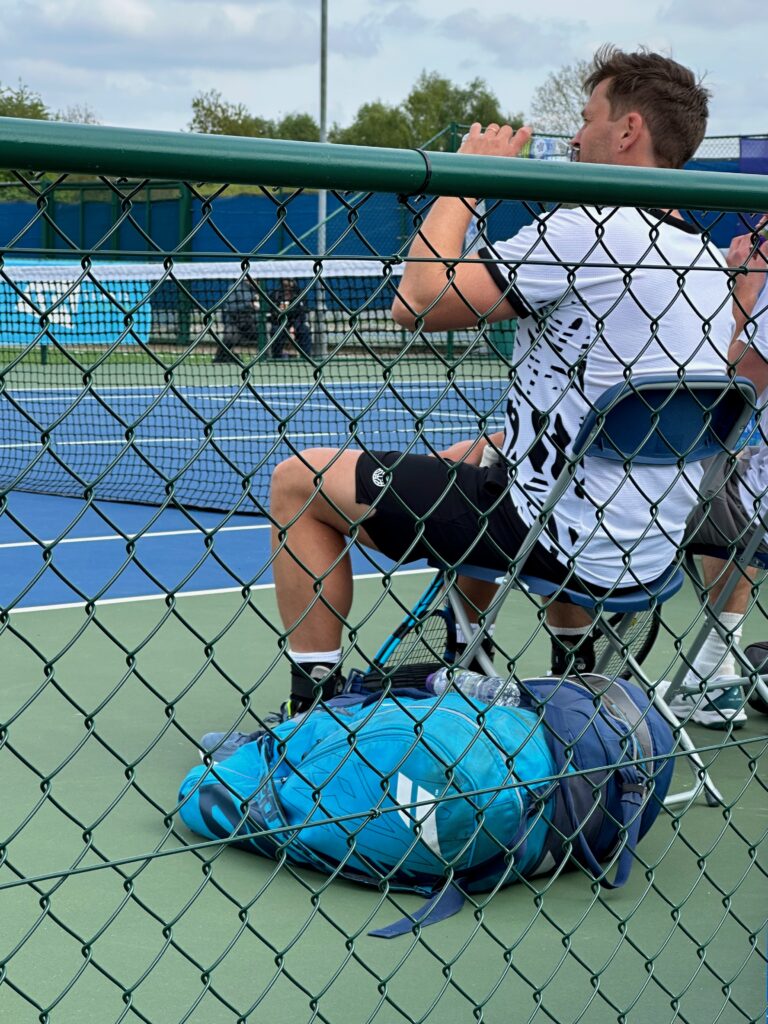
Marcus Willis playing at ITF Futures Nottingham 25K
AB: What was it like to play Federer?
MB: I wasn’t massively star struck because I just wanted to win the match. I knew it was a big deal and I knew he was probably the best player on grass. I had respect for him, but I wanted to win and when I came off the court, I was disappointed that I didn’t. It’s only now that I look back and think “Wow, that’s pretty cool; I played one of the greats.” But equally if I played Rafa or Djokovic or Andy, I would have been just as happy. He’s a lovely guy, a real gentleman off court. But, he competes hard on court. He didn’t give me anything that day, and I wouldn’t expect anything else. But when people ask, what’s my best day, it was that Monday when I won the first round or winning the qualifier. It wasn’t the day I played Federer, because I lost.
When you think about 2016, two weeks before my run, I was signing in for qualies like all of the guys and then two weeks later, I was on national TV. It was strange. I liked it and I didn’t like it. I didn’t do the right thing all the time when I was younger. It’s very easy to forget who you are and what you are doing and get very wrapped up in all of that other stuff. It was nice, but it was also very intense. And a lot of people — they’re not bad people — but they go away. I have to accept if I get where I want to get, things are going to happen and I just have to take it with a pinch of salt and move on — try to do what’s right for me and my family. I don’t analyse it too much because I don’t get anywhere with it. It’s good fun and part of the job, but’s that’s it.
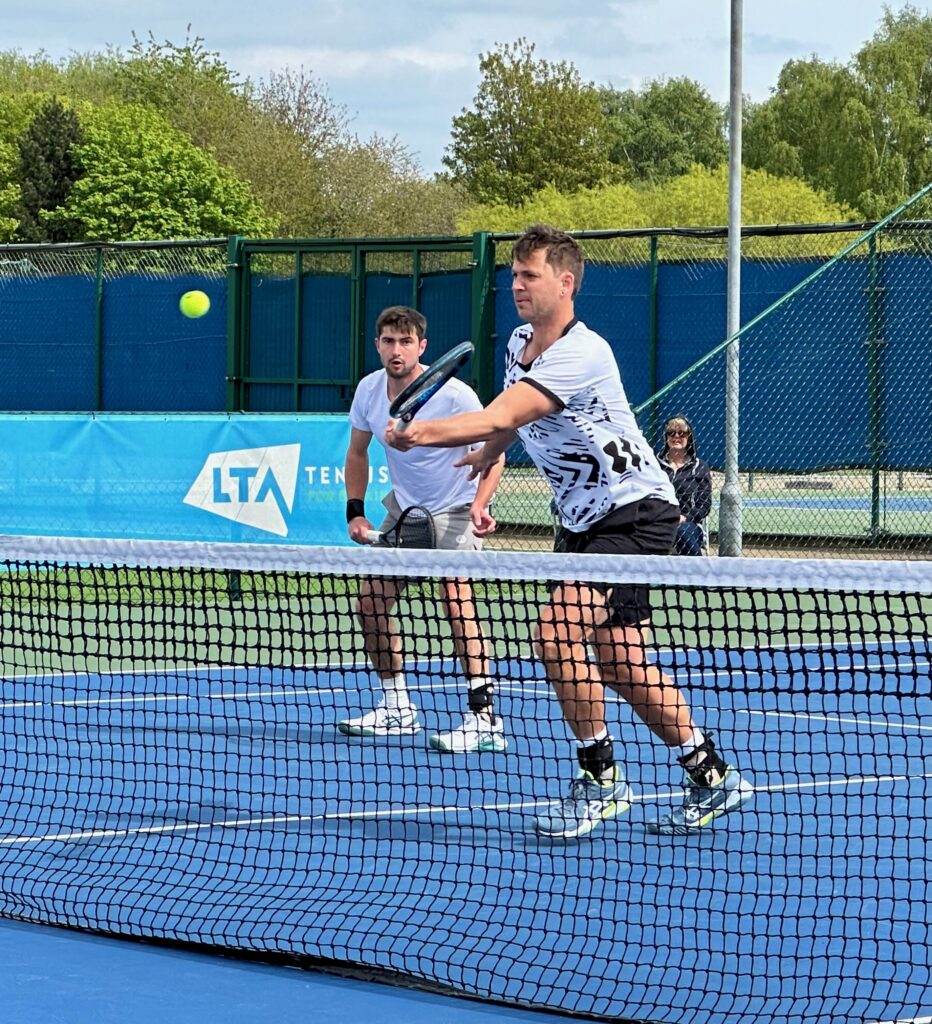
Marcus Willis playing at ITF Futures Nottingham 25K
AB: What’s been the difference between 2016 and 2022?
MW: I took a couple years off; I got married; I had a kid; I got a couple of injuries. I fell out of love with the sport a little bit. I have a family now, so it’s not just about me anymore. I wasn’t thinking about coming back and then someone at the local club said “My company has done well, I would like to sponsor you on the local tour.” I told him that I needed a few months to train. He said “I’ll look after you, whatever you need.”
I started at a Futures tournament in Roehampton with my partner at the time, Mark Whitehouse. I couldn’t get in because I wasn’t ranked and there were no wildcards. I had to sign in on site, and we went as third alternates. Someone pulled out and two others left the premises. While I’m practicing, I get a text that says, “you’re on.” We played against Scott Duncan, my current partner, and we won on match tiebreak. I’m on the ATP board again! Without that piece of luck, I wouldn’t be here now. Scott and I talked and decided to specialise in doubles. We won tournaments in France and Spain and then we had some dreadful results after that. I remember thinking, “Maybe I’m not good enough anymore.” I felt like everything was so quick, I couldn’t react to it. I was miles off. In hindsight, I hadn’t played enough tennis.
AB: How did you whip yourself back into shape?
MW: I just worked very, very hard, I’m in the gym every day and watching what I eat. I get up and have cold showers; do my Wim Hoff breathing, it works for me. I feel amazing. I am also finding ways to maximise my thoughts.
I have a young family so I can’t be messing around. I remember in my mid 20s I would play tournaments, and I was going out afterwards, and just not living the life that should go along with professional sport. So now, I am the opposite. My reputation has changed a little bit. It takes time to shake off. People still look at you… I won a match last week and a guy looked at me and said, “Are you going out on the town to celebrate?” I replied, “I don’t drink anymore.” We lost in the first-round last week and didn’t play a great match. But I’m just focused on playing my best tennis every match and then I know how good I’m going to be. No regrets, no looking back.
AB: What’s it like going out there playing 17 and 18-year-olds? What’s the difference between your game and theirs?
MW: Well, I am only playing doubles now, so thankfully, I don’t have to find out on a singles court.
Everyone is very solid; everyone can move well and keep the ball in the court. There is still a long way to go for these players, however. Even though they are very talented, to be really good, you have to do something different, you have to have that never-give-up attitude, no matter what the result. But players aren’t satisfied with futures; they want to get into challengers. I’ve seen a lot of good players who aren’t around anymore and I’ve seen a lot of players I didn’t think were amazing get into the top 150. You just can’t predict who’s going to make it; it’s such a long journey, sometimes you get a break at 26, sometimes you’re 18, sometimes you’re 32.
AB: Do you think you’re playing the best tennis you ever have? What it’s like to look back on 2016-2017 and remember that guy on Centre Court?
MW: Yeah, I think my results have proven it. The level of tennis is much stronger than it was several years ago — the level of doubles in this country is mad, given how many good players there are — and I’ve never had a run like this in my life. I must be doing something right. But I am aware I have a long road ahead to getting where I want.
AB: Would you say getting married having a family grounded you?
MW: My daughter is six now. She’s been all over the world, but she doesn’t remember it. It’s very humbling, having children — not sleeping changing diapers, it’s very real. Although I am here playing tennis, the very minute I am home, I am back into family life, picking up my daughter from school. It’s nice. I have definitely matured; it’s not just about me anymore, there are consequences now. I look back at myself then and I was quite selfish. Kids don’t care if you win or lose. They are happy for you, but they want to go to the park.
AB: Does it make it harder to be on the road?
MW: Some weeks I think ‘flip me’ I am out here grinding and I would just rather be home. But tennis is what I was born to do. I don’t have that long left and I will always have time to be in my kid’s life. Life is not perfect… ever. And if I was home every day working, I would be like ‘flip me’ why did I never get that break, and I know that because I have been there.
AB: You were a tennis coach at Warwick? Do you miss it?
MW: Yeah, I miss the people. But when I’m home, I’ll go over and have a coffee and say hello to everyone. I enjoy that. Everyone is quite excited to follow me.
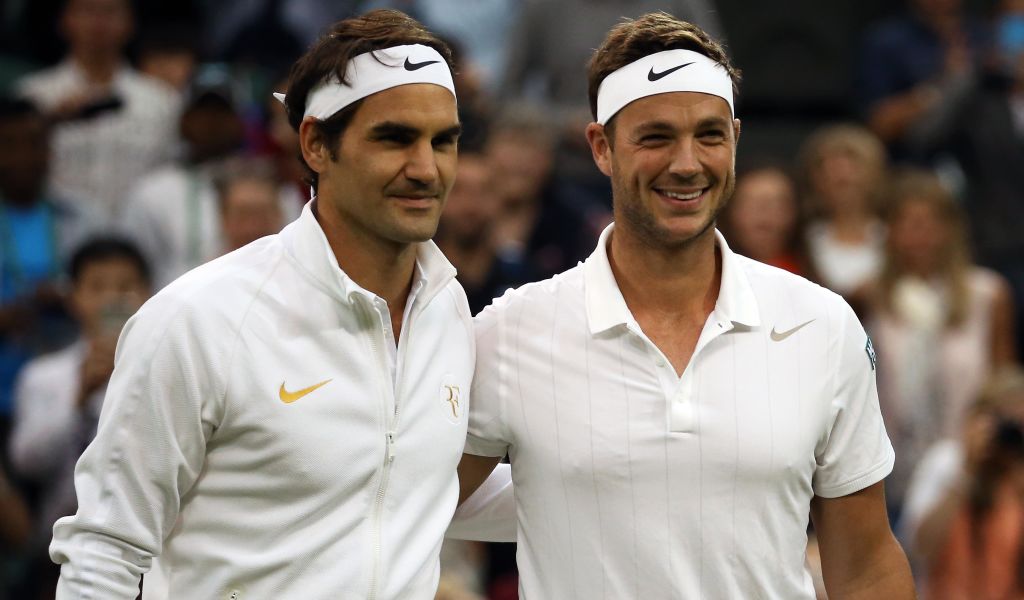
Marcus Willis pictured with Roger Federer after their match at the second round of Wimbledon in 2016
AB: What did your wife (Jennifer Bate, an NHS dental surgeon and former model) say?
MW: She pretty much always wanted me to go out again because I think she saw I had a lot more to offer. When I got offered it, I said ‘thank you very much; I’ll take it.’ But there was a stage when I thought “should I?” My wife reminded me that I have waited a long time for this opportunity. I’ve had a couple of sponsors that gave me a little bit there, but I could never play a full schedule. And now I’ve got the opportunity and I can play as much as I want. So, everything I’ve ever wanted is now being given to me and I’m taking it with two hands. She is there watching on the live stream, going nuts.
AB: How many more years will we see you?
MW: As long as I can play, and believe I can do good things on the tour and not waste people’s time, I will be grinding. If I got to the stage where I’m 150 in the world and not going any further, then I’ll go and get a real job.
